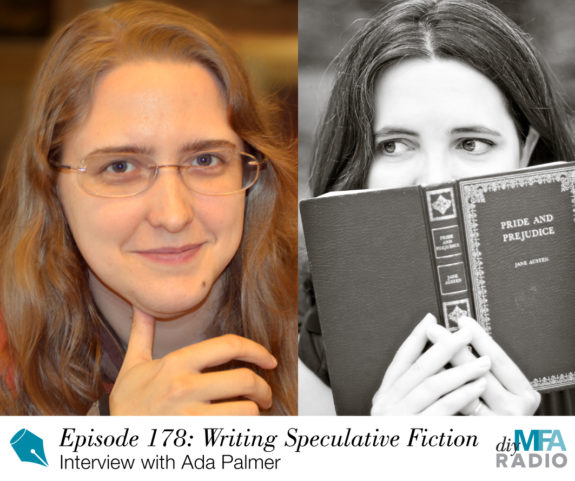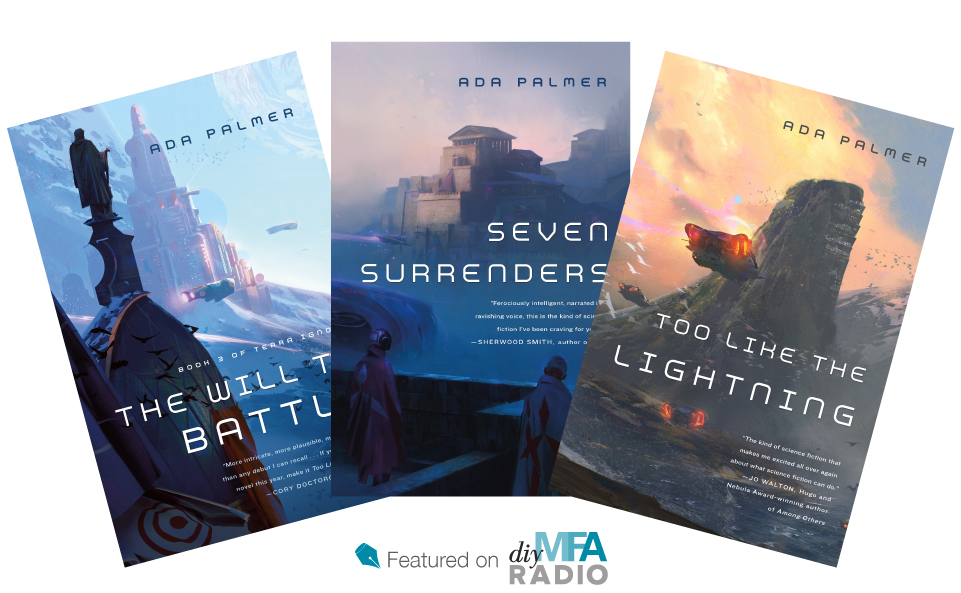Today I have the pleasure of talking with author Ada Palmer on the show!
Ada is an intellectual historian and the author of the four part science fiction series Terra Ignota. The first book in the series (also Ada’s first science fiction novel), Too Like the Lightning, was a Hugo Best Novel Finalist in 2017 and is followed by Seven Surrenders and The Will to Battle which just released this month.
In addition to writing these awesome books, Ada composes fantasy, Sci-Fi, and mythology-themed music, performs at conventions with her vocal group Sassafrass, researches anime and manga, and blogs about philosophy and travel.
Listen in as we chat about Ada’s epic series, and the art of world building in speculative fiction.
In this episode Ada and I discuss:
- How to avoid being pigeonholed by your books and your brand.
- Why thinking like a historian aids world building.
- Ada’s personal techniques for building multiple worlds at once.
- Avoiding the info. dump, crafting an opening scene of speculative fiction the right way.
- Fiction burn, what it is and how to avoid it in your novel.
Plus, Ada’s #1 tip for writers.
About Ada Palmer
Ada Palmer teaches in the University of Chicago History Department, studying the Renaissance, Enlightenment, classical reception, the history of books, publication and reading, and the history of philosophy, heresy, science and atheism, and is the author of Reading Lucretius in the Renaissance from Harvard University Press. She often researches in Italy, usually in Florence or at the Vatican.
She composes fantasy, science-fiction and mythology-themed music, including the Viking mythology musical stage play Sundown: Whispers of Ragnarok (available on CD and DVD), and often performs at conventions with her vocal group Sassafrass. She also researches anime/manga, especially Osamu Tezuka, early post-WWII manga and gender in manga, and has worked as a consultant for many anime and manga publishers. She blogs for Tor.com, and writes the philosophy & travel blog ExUrbe.com.
Ada’s first science-fiction novels Too Like the Lightning, a 2017 Hugo Best Novel Finalist, and Seven Surrenders (volumes one and two of Terra Ignota, from Tor Books) explore how humanity’s cultural and historical legacies might evolve in a future of borderless nations and globally commixing populations. The third volume of this four-book series, The Will to Battle is available now.
To connect with Ada check out her websites at www.adapalmer.com and www.exurbe.com.
Terra Ignota Series
Book 1: Too Like the Lightning
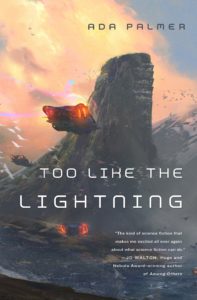
From the winner of the 2017 John W. Campbell Award for Best New Writer, Ada Palmer’s 2017 Compton Crook Award-winning political science fiction, Too Like the Lightning, ventures into a human future of extraordinary originality
Mycroft Canner is a convict. For his crimes he is required, as is the custom of the 25th century, to wander the world being as useful as he can to all he meets. Carlyle Foster is a sensayer–a spiritual counselor in a world that has outlawed the public practice of religion, but which also knows that the inner lives of humans cannot be wished away.
The world into which Mycroft and Carlyle have been born is as strange to our 21st-century eyes as ours would be to a native of the 1500s. It is a hard-won utopia built on technologically-generated abundance, and also on complex and mandatory systems of labelling all public writing and speech. What seem to us normal gender distinctions are now distinctly taboo in most social situations. And most of the world’s population is affiliated with globe-girdling clans of the like-minded, whose endless economic and cultural competition is carefully managed by central planners of inestimable subtlety. To us it seems like a mad combination of heaven and hell. To them, it seems like normal life.
And in this world, Mycroft and Carlyle have stumbled on the wild card that may destabilize the system: the boy Bridger, who can effortlessly make his wishes come true. Who can, it would seem, bring inanimate objects to life…
Book 2: Seven Surrenders
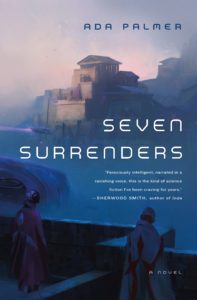
In a future of near-instantaneous global travel, of abundant provision for the needs of all, a future in which no one living can remember an actual war…a long era of stability threatens to come to an abrupt end.
For known only to a few, the leaders of the great Hives, nations without fixed locations, have long conspired to keep the world stable, at the cost of just a little blood. A few secret murders, mathematically planned. So that no faction can ever dominate, and the balance holds. And yet the balance is beginning to give way.
Mycroft Canner, convict, sentenced to wander the globe in service to all, knows more about this conspiracy the than he can ever admit. Carlyle Foster, counselor, sensayer, has secrets as well, and they burden Carlyle beyond description. And both Mycroft and Carlyle are privy to the greatest secret of all: Bridger, the child who can bring inanimate objects to life.
Book 3: The Will to Battle
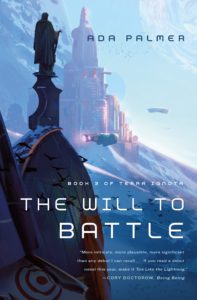
The long years of near-utopia have come to an abrupt end.
Peace and order are now figments of the past. Corruption, deception, and insurgency hum
within the once steadfast leadership of the Hives, nations without fixed location.
The heartbreaking truth is that for decades, even centuries, the leaders of the great Hives
bought the world’s stability with a trickle of secret murders, mathematically planned. So
that no faction could ever dominate. So that the balance held.
The Hives’ façade of solidity is the only hope they have for maintaining a semblance of
order, for preventing the public from succumbing to the savagery and bloodlust of wars
past. But as the great secret becomes more and more widely known, that façade is slipping away.
Just days earlier, the world was a pinnacle of human civilization. Now everyone―Hives
and hiveless, Utopians and sensayers, emperors and the downtrodden, warriors and
saints―scrambles to prepare for the seemingly inevitable war.
If you decide to check out the books in the Terra Ignota series—Too Like the Lightning, Seven Surrenders, and The Will to Battle or if you want to check out the novel Ada gave as an example of fiction burn Jacques the Fatalist and His Master—we hope you’ll do so via these Amazon affiliate links. This means, if you choose to purchase via one of these links, DIY MFA gets a referral fee at no cost to you.
(Right-click to download.)
If you liked this episode…
Head over to iTunes, Stitcher Radio or Google Play and subscribe so you’ll be first to know when new episodes are available.
Also, remember that sharing is caring so if you know anyone who might enjoy this podcast, please tell them about it or leave us a review so other listeners will want to check it out.
Until next week, keep writing and keep being awesome!




